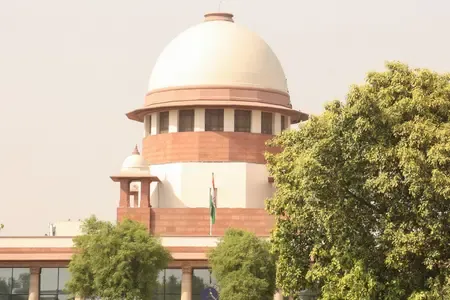Will the Supreme Court Hear the Challenge Against the Block on 4PM YouTube Channel?

Synopsis
Key Takeaways
- The Supreme Court will address critical issues regarding free speech.
- The challenge was initiated by journalist Sanjay Sharma.
- The case questions the government's use of national security as a justification for censorship.
- The Editors Guild of India advocates for transparency in content removal.
- This case could set a significant precedent for journalistic freedom.
New Delhi, May 10 (NationPress) The Supreme Court is set to hear on Tuesday a petition from journalist Sanjay Sharma contesting the order to block the YouTube channel 4PM News Network on the basis of "national security" and "public order".
The agenda published on the apex court's website indicates that a panel of Justices BR Gavai and AG Masih will continue discussions on this issue on May 13. On the preceding Monday, the Justice Gavai-led panel issued a notice and requested feedback from the Union government, which includes the Ministry of Home Affairs, as well as YouTube.
During a prior session, as the request for temporary relief was presented, the top court informed senior advocate Kapil Sibal, who represented the petitioner, that it was not willing to issue any interim directive without hearing the opposing side.
In his writ petition submitted to the apex court, the editor of the digital news outlet contended that the failure to provide the blocking order or the underlying complaint infringes upon both statutory and constitutional protections. The petition stated, "Rules 8, 9, and 16 of the Information Technology (Procedure and Safeguards for Blocking for Access of Information by Public) Rules, 2009, which allow blocking without prior notice or hearing, violate Articles 14, 19(1)(a), and 21 of the Constitution, as they contravene principles of natural justice and usher in a shadowy regime of censorship lacking transparency and accountability."
Moreover, it emphasized that the Constitution does not allow for the indiscriminate removal of content without providing an opportunity for a hearing. The petition further stated, "National security" and "public order" cannot be invoked as blanket shields to protect executive actions from scrutiny. While these grounds are recognized under Article 19(2), they must adhere to the standards of reasonableness and proportionality.
According to the petition, a vague reference to these grounds, without disclosing the specific content deemed offensive, creates barriers for the petitioner to contest or rectify the allegation, thereby infringing upon his fundamental right to free speech and due process.
The Editors Guild of India, in a recent press release, expressed its profound concern regarding the Union government's decision to block the YouTube channel 4PM News Network, characterizing the action as "an opaque exercise of executive power, conducted without prior notice or a chance for rebuttal." The Guild reiterated its call for a transparent and accountable process for content removal, especially concerning journalistic endeavors. It added, "National security should not serve as a pretext to silence critical voices or independent journalism."










